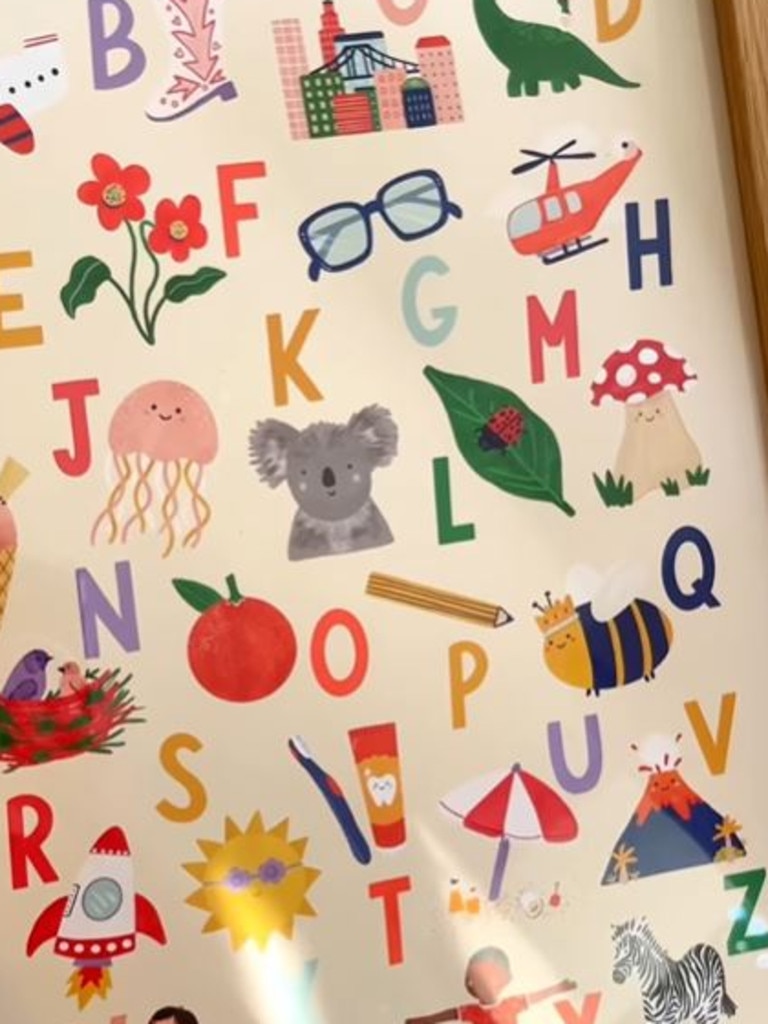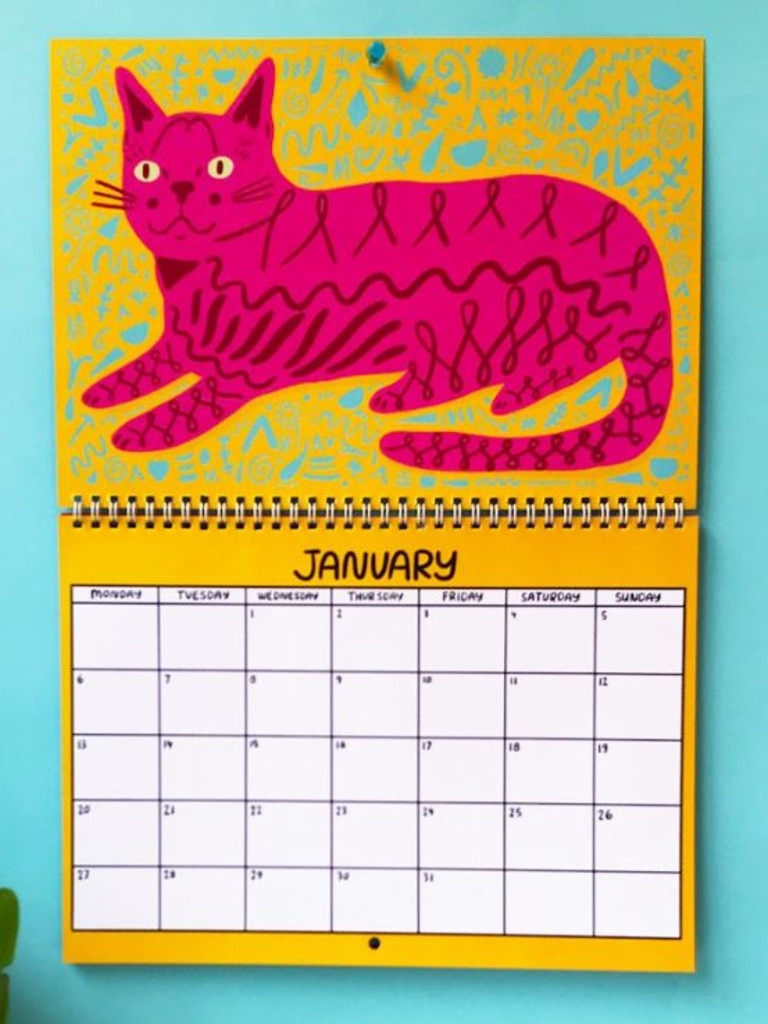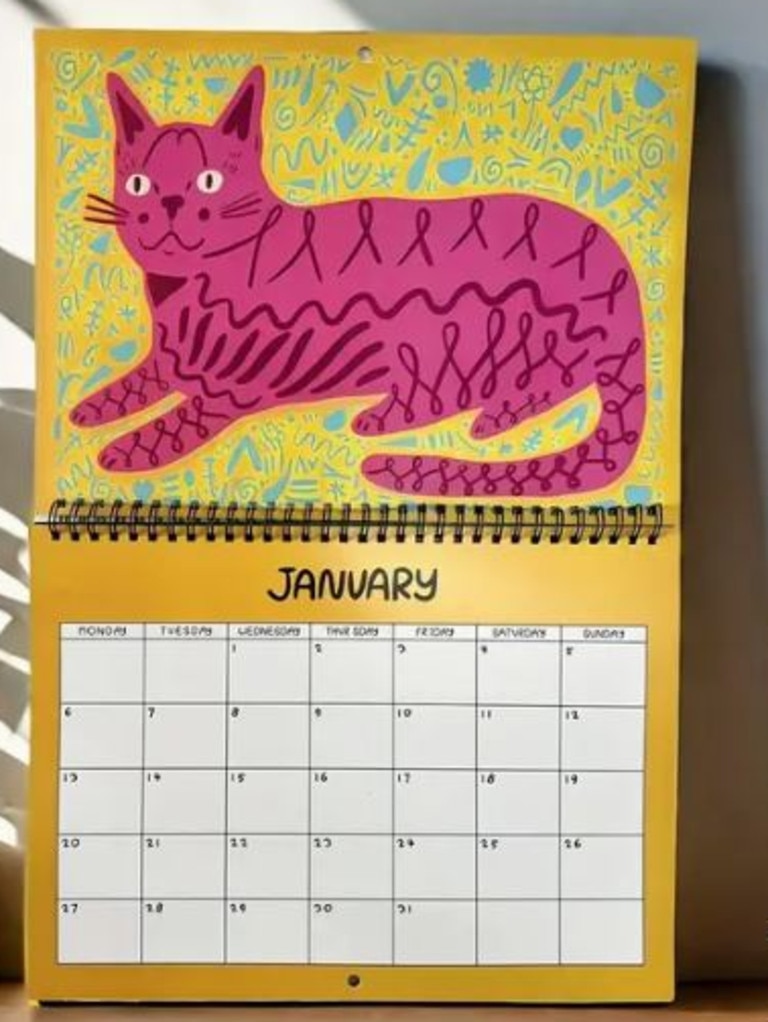‘Heartbreaking’: Aussie mum’s plea after work ‘stolen’ and sold for $4 on Temu
A Queensland mum has hit out at a retail juggernaut after it was caught selling near-identical copies of her best-selling item.
“Seeing art that you have poured your heart into stolen and mass produced is heartbreaking. It feels like a violation.”
A Queensland mum has called out online marketplace Temu for ripping off her artwork and selling it hundreds of times over for the bottom dollar price of $4.
Sunshine Coast graphic designer Lauren Sissons sells colourful greeting cards, prints and children’s educational flash cards with hand-drawn illustrations.
But for the second time this year, her designs – often created at night as her children sleep – have been stolen and sold on the Chinese shopping app.
Making the theft sting more is seeing the near-identical product snapped up by more than 800 bargain hunters.

‘Platforms profiting off the labour and love of artists’
Temu is a digital storefront for “millions of sellers, manufacturers and brands”, offering products at incredibly low prices and owned by Chinese company PDD Holdings.
The retail juggernaut only launched two years ago, but it attracts 1.66 million Australian shoppers to the site each month, according to Roy Morgan research.
In an Instagram video, Mrs Sissons accused Temu of ruining small businesses.
“Temu are at it again, out here stealing artist’s work, mass producing it and taking no accountability,” the mum-of-two said.
A follower sent Mrs Sissons a picture of her $25 Alphabet print listed on Temu for just $4. It is her most involved illustration, crafted over 50 hours.
“Seeing art you have poured your heart into, stolen … is heartbreaking,” she told news.com.au.
“Only you know how much work went into one design, and it feels like a violation for someone to be spending hours trawling the internet looking for art to steal and put into production for their own gain.
“These platforms are profiting off the labour and love of artists and creators all over the world, with no accountability.”


‘Endless sellers using stolen designs’
The graphic designer set up her art studio in 2022, selling a small number of greeting cards. Now she has 200 stockists worldwide.
In May, while browsing Pinterest, she saw her card being advertised.
“I knew immediately it was not my real product … When I clicked on the ad, it took me to Temu and I could see designs stolen from myself and other artists, being sold in the hundreds by this seller on the site,” she said.
“There were endless sellers using stolen designs to sell as their own products.”
After emails with Temu, she was able to get the listings removed.
Other digital marketplaces taking artwork
Melbourne designer Anna Blandford, of Able And Game, is another victim of copyright infringement.
A knock-off of her 2024 Kitty Calendar was found on 10 Temu listings in 2023, as well as websites Shein, eBay and Amazon at a fraction of her price.
The listings even used her website’s photos and written description.
After emailing Temu with links to images of her making the calendar, the listings were removed.
When Ms Blandford asked Temu for financial compensation, as some vendors had 600 sales, she was only given the sellers’ details. She didn’t take it further.
“At first, we thought (it) might have been scams, but when we found the items on Temu with reviews we realised it was a counterfeit item,” she said.
When searching Temu this week after being contacted for this story, Ms Blandford found her $25 2025 Kitty Calendar, which launched a month ago, listed for just $7.
“Small businesses are already struggling so to spend time and energy on this is really draining,” she said.
“I like to joke that all the creatives will be so drained they’ll stop making and there won’t be anything cute on Temu anymore.”
Melbourne artist Kelsie Cosmic had no clue her vibrant designs were being repurposed and sold on clothing and textiles until she saw a festivalgoer wearing a shirt with her unique print.
When she asked him where he got it, he replied Temu. Browsing the site, she found a blanket with her design had sold 16,000 times.
After calling out the “frustrating” imitations in a viral video, the listings were removed.
“Not only is there the feeling of violation and sadness of the art being stolen, but then the ongoing stress of having to deal with the aftermath,” she told news.com.au.


“(Temu) make it almost impossible to report copyright infringement and the only way that I was able to get them removed was through sharing my story on social media. I felt very burnt out after the whole thing.”
The online copies end up “cheapening” the work of artists, according to Ms Cosmic.
“We can’t charge the same ridiculously low prices, but our work ends up on there anyway,” she said.
“We are forced to lower our prices to compete which affects our livelihood.”
Mrs Sissons agrees the issue is affecting the mental health of business owners.
While she acknowledges the cost of living crisis, she hopes families rethink clicking on a dirt-cheap product that could be stolen.
“Although it is tempting to order from sites like these … There is a reason the prices seem too good to be true … it is having an impact on the environment, the economy, small businesses,” she said.
Temu responds
A Temu spokesperson said in a statement that the company “immediately launched an investigation and have removed the product listings in question” after being contacted by the designers.
“For the first designer, Lauren Sissons, we received her report on August 15 and promptly took down the listings of the infringing products the next working day. For the second designer, Anna Blandford, we removed the product listings promptly after your notification. For the third designer, Kelsie Cosmic, her issue was resolved last year when we detected and removed the infringing products following her report,” the spokesperson said.
“Temu is a marketplace where third-party sellers offer their products directly to consumers. Each listing is created and managed by independent merchants. We require sellers to comply with relevant requirements and standards in their intended markets. When we receive reports of infringement, we promptly investigate each case and take appropriate actions, such as removing product listings and images.
“Since our launch, we have prioritised intellectual property protection, making significant investments and continuous improvements based on feedback from brands and copyright owners. In September last year, we transitioned from processing complaints via email to launching a dedicated IP protection portal. This portal makes it easier for rights holders to submit and track their cases.
“We have also introduced an enhanced brand protection centre and have been expanding our IP protection team. We will continue to explore ways to better protect the intellectual property rights of artists and help them more effectively defend their rights.”
Who is shopping on Temu?
The number of Australian shoppers buying on Temu has grown by 30 per cent in nine months, and it’s expected Temu will hit and possibly surpass $2 billion in annual sales.
New data from research company Roy Morgan shows 3.8 million Australians aged 14 years and older are buying from Temu at least once over 12 months “thanks to a mix of ultra-cheap prices, free delivery and aggressive marketing and media spend”.
“It’s been extraordinary to witness the continued rise of these ultra cheap platforms … where they have enjoyed the kind of growth that Australian retailers can only dream of in this climate,” said Laura Demasi, Roy Morgan’s head of retail research and consumer trends.

“These numbers confirm that the ‘trading down’ phenomenon is real. Every month, more and more Australians are trading down to these platforms to stretch their dollars further, redirecting billions of dollars away from Australian retailers.”
While the global marketplace has exploded in popularity, it hasn’t come without problems.
Australian cybersecurity expert Susan McLean raised concerns about the security risks shopping on these types of websites in April.
Ms McLean told Sunrise at the time that a second concern was the number of emails customers receive after shopping on Temu, which encourage the purchase of more products. She advises to never click those links.
Temu is also under increased scrutiny in the United States, Europe and elsewhere over its business practices, advertising and handling of user data.
In response to concerns about its use of customers’ personal data, Temu told news.com.au it collects “the minimum information necessary” to manage and complete orders, deliver services and process payments, communicate with the user about their orders, products and offers that might interest them and personalise the user’s shopping experience and make product recommendations.






